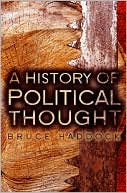
Haddock's prose is clear and engaging and its texture is enriched by a wide range of reference ... it will serve as an excellent overview for students of political thought, introducing them to the major concepts and thinkers and helping to persuade them of their continued importance. –Times Higher Education
Bruce Haddock has produced a book that is as profound as it is comprehensive and thought-provoking. He takes us from the pre-history of political thought to today's global politics, and does so with scholarly authority, clarity and elegance. This will undoubtedly become one of the standard works of reference in the history of political thought. –Jeremy Jennings,
Offers an admirably accessible and succinct survey of the main contours of Western political thought, from the ancient Greek city-state to today's global village. –
 Democratic Reform in
Democratic Reform in
Widespread dissatisfaction in
 Innovating Democracy: Democratic Theory and Practice after the Deliberative Turn (BOOK): by Robert E. Goodin
Innovating Democracy: Democratic Theory and Practice after the Deliberative Turn (BOOK): by Robert E. Goodin
In recent years democratic theory has taken a deliberative turn. Instead of merely casting the occasional ballot, deliberative democrats want citizens to reason together. They embrace 'talk as a decision procedure'. But of course thousands or millions of people cannot realistically talk to one another all at once. When putting their theories into practice, deliberative democrats therefore tend to focus on 'mini-publics', usually of a couple dozen to a couple hundred people.
The central question then is how to connect micro-deliberations in mini-publics to the political decision-making processes of the larger society. In Innovating Democracy, Robert Goodin surveys these new deliberative mechanisms, asking how they work and what we can properly expect of them. Much though they have to offer, they cannot deliver all that deliberative democrats hope. Talk, Goodin concludes, is good as discovery procedure but not as a decision procedure. His slogan is, 'First talk, then vote'. Micro-deliberative mechanisms should supplement, not supplant, representative democracy. Goodin goes on to show how to adapt our thinking about those familiar institutions to take full advantage of deliberative inputs. That involves rethinking who should get a say, how we hold people accountable, how we sequence deliberative moments and what the roles of parties and legislatures can be in that. Revisioning macro-democratic processes in light of the processes and promise of micro-deliberation, Innovating Democracy provides an integrated perspective on democratic theory and practice after the deliberative turn.
 Investing in Democracy: Engaging Citizens in Collaborative Governance (BOOK): by Carmen Sirianni
Investing in Democracy: Engaging Citizens in Collaborative Governance (BOOK): by Carmen Sirianni
The health of American democracy ultimately depends on our willingness and ability to work together as citizens and stakeholders in our republic. Government policies often fail to promote such collaboration. But if designed properly, they can do much to strengthen civic engagement. That is the central message of Carmen Sirianni's eloquent new book. Rather than encourage citizens to engage in civic activity, government often puts obstacles in their way. Many agencies treat citizens as passive clients rather than as community members, overlooking their ability to mobilize assets and networks to solve problems. Many citizen initiatives run up against rigid rules and bureaucratic silos, causing all but the most dedicated activists to lose heart.
The unfortunate (and unnecessary) result is a palpable decline in the quality of civic life. Fortunately, growing numbers of policymakers across the country are figuring out how government can serve as a partner and catalyst for collaborative problem solving. "Investing in Democracy" details three such success stories: neighborhood planning in
 Is Democracy Exportable? (BOOK): edited by Zolton Barany and Robert G. Moser
Is Democracy Exportable? (BOOK): edited by Zolton Barany and Robert G. Moser
Can democratic states transplant the seeds of democracy into developing countries? What have political thinkers going back to the Greek city-states thought about their capacity to promote democracy? How can democracy be established in divided societies? In this timely volume a distinguished group of political scientists seeks answers to these and other fundamental questions behind the concept known as "democracy promotion." Following an illuminating concise discussion of what political philosophers from Plato to Montesquieu thought about the issue, the authors explore the structural preconditions (culture, divided societies, civil society) as well as the institutions and processes of democracy building (constitutions, elections, security sector reform, conflict, and trade). Along the way they share insights about what policies have worked, which ones need to be improved or discarded, and, more generally, what advanced democracies can do to further the cause of democratization in a globalizing world. In other words, they seek answers to the question, Is democracy exportable?

The George W. Bush administration’s ambitious—even breathtaking—claims of unilateral executive authority raised deep concerns among constitutional scholars, civil libertarians, and ordinary citizens alike. But Bush’s attempts to assert his power are only the culmination of a near-thirty-year assault on the basic checks and balances of the
Tracing this tendency back to the first Reagan administration, Shane shows how this era of "aggressive presidentialism" has seen presidents exerting ever more control over nearly every arena of policy, from military affairs and national security to domestic programs. Driven by political ambition and a growing culture of entitlement in the executive branch—and abetted by a complaisant Congress, riven by partisanship—this presidential aggrandizement has too often undermined wise policy making and led to shallow, ideological, and sometimes outright lawless decisions. The solution, Shane argues, will require a multipronged program of reform, including both specific changes in government practice and broader institutional changes aimed at supporting a renewed culture of government accountability.
From the war on science to the mismanaged war on terror, Madison’s Nightmare outlines the disastrous consequences of the unchecked executive—and issues a stern wake-up call to all who care about the fate of our long democratic experiment.



No comments:
Post a Comment